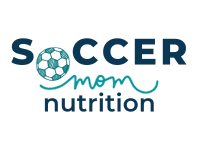Setting Nutrition Goals – Ultimate Guide for Athletes
Setting nutrition goals is essential for athletes to stay motivated and focused on your progress. This is especially true when you’re setting nutrition goals to support optimal sports performance.
However, not all goals are created equally. When goals are vague and unrealistic, it makes it hard to achieve them.
Also when you set a goal that you can’t achieve, you feel defeated.
That’s where SMART goals come in.
When you have the right method to set goals, you’ll set yourself up for success.
Read on to learn more about setting nutrition goals you can achieve.

Please note that this article contains affiliate links. If you click one of these links and make a purchase, we may earn a commission. As an Amazon Associate, we earn from qualifying purchases.
What are the 5 rules for setting SMART goals
The five rules for setting SMART goals are to make them: Specific, Measurable, Achievable, Relevant and Time bound.
Let’s break down each element for setting nutrition goals:
Specific: A specific goal is clear and straight forward.
It answers the questions:
- What do I want to achieve?
- Why is it important?
- Who is involved?
For example, instead of setting a goal to “improve my hydration,” a specific goal would be “increase my hydration during the day so I am not dehydrated when I get to practice.”
Measurable: A measurable goal can be measured to show and track progress.
It answers the questions:
- How will I know when I’ve achieved it?
For example, you could measure how much water you drink throughout the day by tracking the number of times you have to fill up your water bottle.
Achievable: An achievable goal is challenging but something you can accomplish.
It answers the question:
- Is it possible for me to achieve this goal?
For example, if your current hydration level is low, setting a goal to double it in a week is not achievable. Instead, set a goal that’s challenging but doable based on your current level.
Relevant: A relevant goal aligns with your overall objectives and values.
It answers the question:
- Does this goal matter to me?
For example, if your primary objective is to improve your overall hydration to improve performance, setting a goal to drink more water throughout the day is relevant.
Time-bound: A time-bound goal has a timeframe for the goal to be done.
It answers the question:
- When do I want to achieve this goal?
For example, if you want to increase your hydration, set a timeframe for the end of the two weeks.
Keys to setting nutrition goals
While setting SMART goals is an excellent starting point for achieving your sports performance goals, sticking to these goals isn’t always easy.
Many factors can make it hard to stay consistent and build habits. This includes, busy game and practice schedules, losing motivation, frustration when you don’t meet a step in the goal and unexpected situations that make it hard to follow through.
SMART goal action plan for setting nutrition goals
Setting a goal is one thing, but putting in place a plan to achieve it is another. Once you set your SMART goal, you need to identify the specific steps and actions you will take to make your goal happen. (1).
By creating an action plan, you can decide when, where and how you will implement the steps to achieve your goal. This may be a few detailed steps that when taken together will help you meet your goal.
In the hydration example above, you may set your goal to achieve adequate hydration before practice.
Some actions you might take include, putting a water bottle by your bed so you can begin hydrating when you wake up. Then maybe you’ll set an alarm to remind you to drink throughout the day.
You’ll want to set an action plan that’s easy to follow and helps you take steps towards the goal.
Plan for setbacks and challenges
It’s also important to recognize that setbacks will occur. This happens. But the key is to have a back up plan and steps to help you get back on track as soon as possible.
When you’re writing your action plan, think about what could prevent you from being successful. Then think about some steps you could take if you run into a barrier, so that you can get back on track.
Also, be prepared to adjust your action plan if you try something and it doesn’t work. Reflecting on your progress and check in regularly so you can make changes if needed.
Track progress towards achieving goals
To overcome challenges and keep moving towards your goal, you need to stay motivated and hold yourself accountable. Find ways to stay motivated, such as tracking your progress in a journal or finding an accountability partner, such as a teammate.
Celebrate success
Celebrate your successes along the way and learn from your mistakes. Every time you achieve a goal that is a step toward achieving your athletic and sports nutritional goals.
Remember that achieving your nutrition goals is a journey, and setbacks and challenges are a part of it. Stay focused, stay motivated and stay committed, and you’ll be well on your way to achieving your goals.

Final thoughts for setting nutrition goals
When setting nutrition goals, use the SMART goal framework to develop goals you can achieve. Also remember that a key component of the SMART goals framework is developing an action plan with steps to help you reach your goal.
One common issue is that athletes might set too ambitious or unrealistic goals, which can be discouraging when they can’t achieve them.
So if you set achievable goals that are challenging yet realistic, you can build confidence and momentum as you progress. Sometimes setting positive affirmations in addition to your goals can help you achieve success.
You may even build life-long habits along the way.
Join our mailing list and get our FREE Pre-Activity Fueling Guide.
Stephanie Magill, MS, RD, CD, FAND has over 22 years of experience in public health and nutrition. As a performance registered dietitian nutritionist, Stephanie specializes in sports nutrition and provides simple and actionable information so that athletes can be well fueled for high performance on and off the field. Stephanie has a Master’s Degree in Nutrition and is a Fellow of the Academy of Nutrition and Dietetics.

